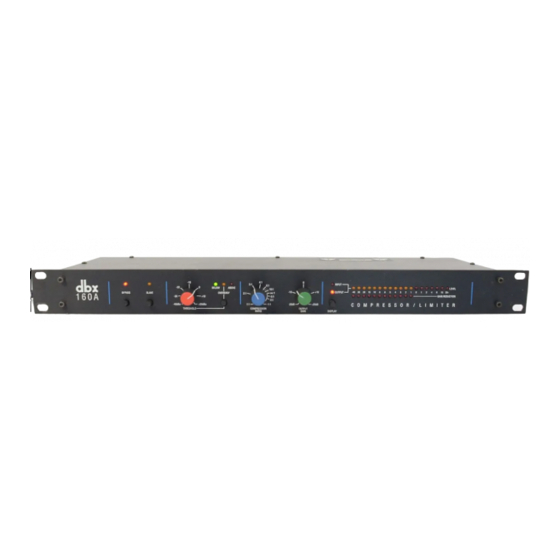dbx 160A Manuale di istruzioni - Pagina 11
Sfoglia online o scarica il pdf Manuale di istruzioni per Apparecchiature musicali dbx 160A. dbx 160A 20. Compressor limiter
Anche per dbx 160A: Opuscolo e specifiche (2 pagine)

Negative ratios can also be used to prevent musicians from continually increasing the volume of their instrument (e.g.,
in live applications where there is no sound engineer to control the house levels). With their signal compressed by a neg-
ative COMPRESSION RATIO, each volume increase initiated at the instrument or amp would actually decrease the
volume level at the final mix.
Fattening Kick Drums and Compressing Other Drums
Weak, flabby kick drums often have too much boom, and not enough slap. To tighten them up, start with the 160A
adjusted for a medium to high COMPRESSION RATIO (e.g., 6:1), adjust the THRESHOLD control so that the GAIN
REDUCTION meters show 15dB of gain reduction, then increase the COMPRESSION RATIO if necessary. In
OverEasy mode, the 160A takes slightly longer to react than in Hard Knee mode, and will therefore emphasize the slap
at the beginning of the note and reduce the boominess of its body. The 160A also works well for tightening snare drums
and tom toms and can be used with drum machines to effectively alter the character of any electronic drum sound.
For drum kit submixes (e.g., mixing multiple drum tracks to two tracks while using two 160As for compression), con-
sider backing off the COMPRESSION RATIO on each 160A (down to 2:1) to avoid an excess of cymbal "splattering."
In larger multitracking systems, compress the kick and snare separately. A further possibility (if you have two more
compressors) is to heavily compress a stereo submix of toms and leave the remaining percussives unaffected.
Raising a Signal Out of a Mix
Since reducing dynamic range increases the average signal level by a small amount, a single track can be raised out of a
mix by boosting its level slightly and applying compression. Start with a 2:1 COMPRESSION RATIO and a relatively
low THRESHOLD setting (-20dB). Adjust both controls as necessary.
Compressors have also been used to bring vocals to the forefront of a mix in volume-restricted studios (e.g. home stu-
dios). Start by adding a foam windscreen to the mic (if it doesn't have one). Set the COMPRESSION RATIO to 10:1 and
the THRESHOLD to -10dB. With your mouth approximately 2 inches from the mic, sing the vocal part, but with less
volume than normal. Use phrasing to give the part some intensity. An equalizer (e.g., a dbx 20 or 30 Series Graphic
Equalizer) or a vocal effects device (e.g., reverb, delay, distortion) can be added to further toughen the performance.
It is also possible to separate certain vocals or instruments from a mono program already mixed: refer to frequency-
weighted compression on page 8.
Note: When compressing a stereo program with a pair of 160As, the factors affecting a compression curve and the actual COMPRESSION RATIO and
THRESHOLD settings, are like those previously covered with reference to single channels of program material. However, it will generally be found that
large amounts of compression are more audible in a mixed stereo program than they might be on the separate tracks that were mixed to create the pro-
gram.
Preventing Analog Tape Saturation
With programs of widely varying levels, compression can prevent recording levels (e.g., cymbal tracks in a final mix or
drum kit submix) from saturating tape tracks (see frequency-weighted compression, below).
Preventing Digital Overload
Some digital recorders and samplers produce audible distortion when they exceed their headroom (i.e., the range above
their normal operating level). The 160A effectively ensures that audio input does not overload a digital recorder's D/A
(digital-to-analog) converters. The 160A can perform this compression quietly enough for all digital media. Set the
160A for limiting with Hard Knee mode On, the COMPRESSION RATIO to ∞:1, and set the THRESHOLD 2 to 3dB
below the overload point of the recorder.
Speaker Protection (Auditoriums, Churches, Mobile DJs and Sound Systems)
Compressors are frequently used to prevent excessive program levels from damaging drivers in a sound-reinforcement
system (whether you're doing auditorium, church, or club sound engineering, or are a mobile DJ for small dances, or
like to push the limits your home's audio entertainment center). Set the 160A for limiting (Hard Knee mode On, with a
COMPRESSION RATIO of 10:1 or greater) and adjust the THRESHOLD to provide 15dB or more of compression (just
a few dB below the input clip). For low-level signals, the 160A won't change gain, but if large signals come along, the
gain will be reduced to prevent clipping and save sensitive system components from excessive heat buildup or other
type of damage .
In circumstances where the 160A is expected to cause no change in gain unless an emergency arises (wildly excessive
levels), some operators set Hard Knee mode On, the COMPRESSION RATIO to ∞:1, and the THRESHOLD to the
highest permissible level.
dbx 160A COMPRESSOR / LIMITER
7
